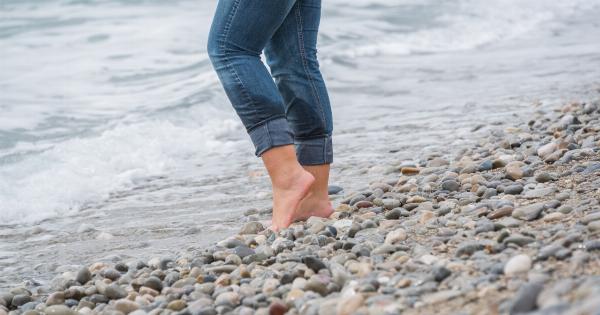Water retention, also known as edema, occurs when excess fluid builds up in your body’s tissues. This condition can cause swelling in various parts of the body, such as the hands, feet, ankles, and legs.
While water retention can be a symptom of an underlying medical condition, it can also be a result of lifestyle factors and certain medications.
If you’re experiencing water retention and swelling, you may feel discomfort and tightness in affected areas.
Fortunately, there are several natural remedies and lifestyle adjustments you can adopt to help manage these symptoms and promote overall well-being. In this article, we will explore ten effective natural remedies for water retention and swelling:.
1. Stay Hydrated
It may seem counterintuitive, but drinking plenty of water can help prevent water retention and swelling. When your body senses dehydration, it goes into a survival mode and holds onto water, leading to bloating and puffiness.
By keeping yourself adequately hydrated, you can promote the proper functioning of your body’s systems and maintain a healthy fluid balance.
2. Maintain a Healthy Diet
A well-balanced diet rich in various nutrients is essential for managing water retention. Incorporating foods that have diuretic properties can help decrease fluid retention by increasing urine production.
Some fruits and vegetables that act as natural diuretics include cucumber, watermelon, celery, and parsley. Additionally, reducing your sodium intake can be beneficial, as excessive sodium consumption can contribute to water retention.
3. Limit Salt Intake
Sodium, commonly found in table salt and processed foods, can contribute to water retention. Excessive salt intake leads to fluid buildup in your body’s tissues.
Avoiding processed and packaged foods, as well as adding less salt to your meals, can help alleviate water retention and reduce swelling.
4. Exercise Regularly
Engaging in regular physical activity can help promote circulation, reduce fluid buildup, and prevent water retention. Exercise improves lymphatic flow, which plays a crucial role in draining excess fluids from the body’s tissues.
Incorporate activities such as walking, swimming, or yoga into your routine to help manage water retention and swelling.
5. Elevate Your Legs
If you experience swelling in your legs or feet, elevating them can help reduce water retention. Lie down and prop your legs up against a wall or use pillows to elevate them while sitting.
This position encourages fluid drainage and can provide relief from discomfort and puffiness.
6. Use Compression Garments
Compression garments, such as socks or stockings, can help prevent fluid buildup and reduce swelling. These garments apply pressure to your limbs, promoting better circulation and preventing water retention.
Consult with a healthcare professional to determine the appropriate compression level and type of garment for your needs.
7. Herbal Remedies
Several herbs possess diuretic properties that can aid in reducing water retention and swelling. Dandelion, nettle leaf, and parsley are commonly used as herbal remedies for edema. These herbs can be consumed as teas or taken in supplement forms.
However, consult with a healthcare professional or a qualified herbalist before incorporating any herbal remedies into your routine, especially if you have any existing medical conditions or are taking medications.
8. Practice Stress Management Techniques
Stress can contribute to water retention and swelling in the body. When you’re stressed, your body releases hormones that can disrupt fluid balance.
Incorporating stress management techniques such as mindfulness meditation, deep breathing exercises, or engaging in activities you enjoy can help reduce stress levels and promote a healthier body.
9. Limit Alcohol Consumption
Alcohol can dehydrate your body and contribute to water retention. It also affects liver function, which plays a crucial role in maintaining proper fluid balance. Limiting alcohol consumption can help prevent water retention and reduce swelling.
10. Practice Self-Care
Engaging in self-care practices can be instrumental in managing water retention and swelling.
Taking warm baths with Epsom salts or using essential oils known for their anti-inflammatory properties, such as lavender or chamomile, can help reduce swelling and promote relaxation. Additionally, getting enough sleep, practicing gentle exercises like yoga or Pilates, and maintaining a healthy weight can contribute to overall well-being and reduce water retention.
While these natural remedies can be effective in managing water retention and swelling, it’s important to consult with a healthcare professional if you experience severe or persistent symptoms.
They can help determine the underlying cause of your condition and provide appropriate guidance and treatment.
By adopting a holistic approach that combines healthy lifestyle choices, diet modifications, and self-care practices, you can alleviate discomfort and promote a balanced and healthier body.































